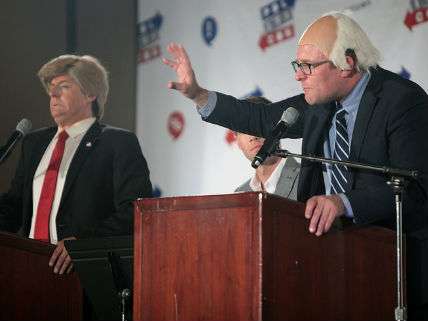Trump's Scrapping of TPP Will Make America Poor Again
American consumers, exporters and manufacturing will get screwed
You know the world, including this great nation, is screwed when a nationalist like Donald Trump and a socialist like Bernie Sanders agree on something. That

happens to be the case with the TPP – or the Trans Pacific Partnership -- the 12-nation free trade agreement that Barack Obama, in a rare move of inspired leadership, negotiated. Together these countries account for 40 percent of the world GDP and house 800 million of the world's population, almost double that of the European Union.
However, fulfilling one his core campaign promises on the first full day of his presidency, Trump officially pulled the United States from the deal.
This was largely a symbolic move because the treaty had not been ratified and Congressional leaders had already signaled after the November elections that there was no path forward for it. But Bernie Sanders instantly tweeted that he is "glad the Trans-Pacific Partnership is dead and gone." And as he made the withdrawal announcement, Trump declared that this was a "great thing for the American worker." He didn't mention that American consumers – aka "importers" – on the other hand would be "raped" (to use his own description for the ill-fated treaty).
Particularly hard hit will be low income households – you know those poor white working-class schlubs that this election was all about – who purchase foreign shoes and apparel at WalMart given that the agreement would have phased out U.S. tariffs most steeply on such items. But it will also affect manufacturers looking for cheap raw material, subverting Trump's core goal of rebuilding American manufacturing, while also limiting their ability to sell abroad given that the deal would have immediately eliminated all tariffs on US non-agricultural goods, and almost all agricultural goods.
But that's not the only Trump goal this move will subvert.
In classic mercantilist vein, Trump believes that exports are good because that means you are selling things and imports are bad because that means you are buying things, not understanding that the whole point of exports is to import just as the point of production is consumption. If we keep selling goods but don't buy anything in return, what would be the point of earning all that money?
But even if exporting is Trump's goal, the TPP would have slashed to zero 18,000 tariffs that the partner countries currently impose on US exports, Mercatus Center's Dan Griswold has pointed out. Americans, especially farmers, would have gained tremendous access to overseas markets.
The most bizarre thing about Trump's hostility to the TPP is that if it has a geo-political goal it is to balance China's growing influence in the Pacific, exactly what Trump wants. The deal, which included, besides the United States, Japan, Malaysia, Vietnam, Singapore, Brunei, Australia, New Zealand, Canada, Mexico, Chile and Peru, pointedly left out China. Now China will cut its own deals with many of these countries with whom it already doesn't have one, basically isolating the United States in the region. (Let me hasten to add, I am not by any means in favor of restoring the 1990s neo-conservative demonization of China when The Weekly Standard had made opposition to Most Favored Nation status and isolation of the Middle Kingdom its signature issue. I'm just trying to point out the internal contradictions in the new president's policies.)
To be sure, the TPP, like most multi-lateral trade agreements, was long and cumbersome and far from perfect. Indeed, it favored more politically connected U.S. exporters who helped write the rules – precisely also what happened in the partner countries, as Reason contributor Veronique de Rugy notes. And it also tried to force all countries to hew to America's intellectual property, environmental and other standards, basically raising the global cost of doing business. Hence, if Trump wanted to replace this 5,500-page treaty with simpler and shorter bilateral agreements with these countries, that would be one thing.
But Trump is doing the exact opposite. As part of his America First rhetoric, he is threatening to restore a 10 percent tariff on all foreign imports and impose an even bigger one on American companies that move operations overseas and then try and import goods back.
In short, he wants to build not just a physical wall around America but also a tariff wall, basically ending America's decades-long championship of global free trade -- not to mention mark a stunning turn for the Grand Old Party to the Grand Old Protectionist party.
That is a total shame and to hear more about why, view Todd Krainin's interview with Cato Institute's Dan Ikenson here.


Show Comments (72)